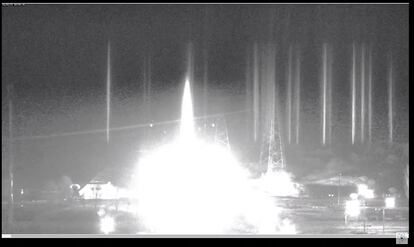Ukraine says Europe’s largest nuclear power plant is under Russian control
The head of the International Atomic Energy Agency states that the safety of the six reactors has not been compromised following a fire that broke out during an overnight attack

The International Atomic Energy Agency (IAEA) said on Friday that the safety of Europe’s largest nuclear plant has not been compromised following a fire that broke out there overnight during a Russian attack.
Firefighters have managed to put out the flames at the Zaporizhzhia power plant in southeastern Ukraine, according to state emergency services. Early on Friday local authorities said that Russian troops were in control of the nuclear complex, which produces 5,700 megawatts of electricity and is larger than Chernobyl, the nuclear plant that suffered a meltdown in 1986.
IAEA Director General Rafael Mariano Grossi said at a special news conference on Friday that “the safety systems of the six reactors were not affected at all, there has been no release of radioactive material,” according to the information relayed to IAEA by sources at the site.
But Grossi added that two people were injured in the attack and that “the situation continues to be extremely tense and challenging.” The director noted that the exact circumstances of the incident remain unclear, but that a projectile apparently hit the site and set fire to a building.
Grossi also offered to travel to Chernobyl to negotiate with Ukraine and Russia to try to ensure the security of Ukraine’s nuclear sites.
“Nuclear terrorism”
Ukrainian President Volodymyr Zelenskiy has accused Moscow of “nuclear terrorism” and of wanting to “repeat Chernobyl.” Zelenskiy has spoken on the phone with US President Joe Biden and with British Prime Minister Boris Johnson, who said that this latest action by Russian president Vladimir Putin could “directly threaten the safety of all of Europe.”
Meanwhile, Russian troops on Friday continued their offensive on major Ukrainian cities including the capital Kyiv, Kharkiv in the northeast and Mariupol in the southeast.
Delegations from Kyiv and Moscow met for a second time in Belarus on Thursday to discuss the conflict. The meeting did not achieve a ceasefire, but both sides agreed to open humanitarian corridors to evacuate civilians. On Wednesday the United Nations refugee agency UNHCR said one million people had already escaped the war-torn country, and estimated that as many as four million could do so in the coming weeks and months.
In Russia, the State Duma – the lower house of parliament – approved prison terms of up to 15 years for individuals found guilty of disseminating “disinformation” about the “special military operation” in Ukraine. Despite the crackdown, a few Russian oligarchs and high-profile figures from the world of culture have spoken out against the invasion in recent days.
Tu suscripción se está usando en otro dispositivo
¿Quieres añadir otro usuario a tu suscripción?
Si continúas leyendo en este dispositivo, no se podrá leer en el otro.
FlechaTu suscripción se está usando en otro dispositivo y solo puedes acceder a EL PAÍS desde un dispositivo a la vez.
Si quieres compartir tu cuenta, cambia tu suscripción a la modalidad Premium, así podrás añadir otro usuario. Cada uno accederá con su propia cuenta de email, lo que os permitirá personalizar vuestra experiencia en EL PAÍS.
¿Tienes una suscripción de empresa? Accede aquí para contratar más cuentas.
En el caso de no saber quién está usando tu cuenta, te recomendamos cambiar tu contraseña aquí.
Si decides continuar compartiendo tu cuenta, este mensaje se mostrará en tu dispositivo y en el de la otra persona que está usando tu cuenta de forma indefinida, afectando a tu experiencia de lectura. Puedes consultar aquí los términos y condiciones de la suscripción digital.








































